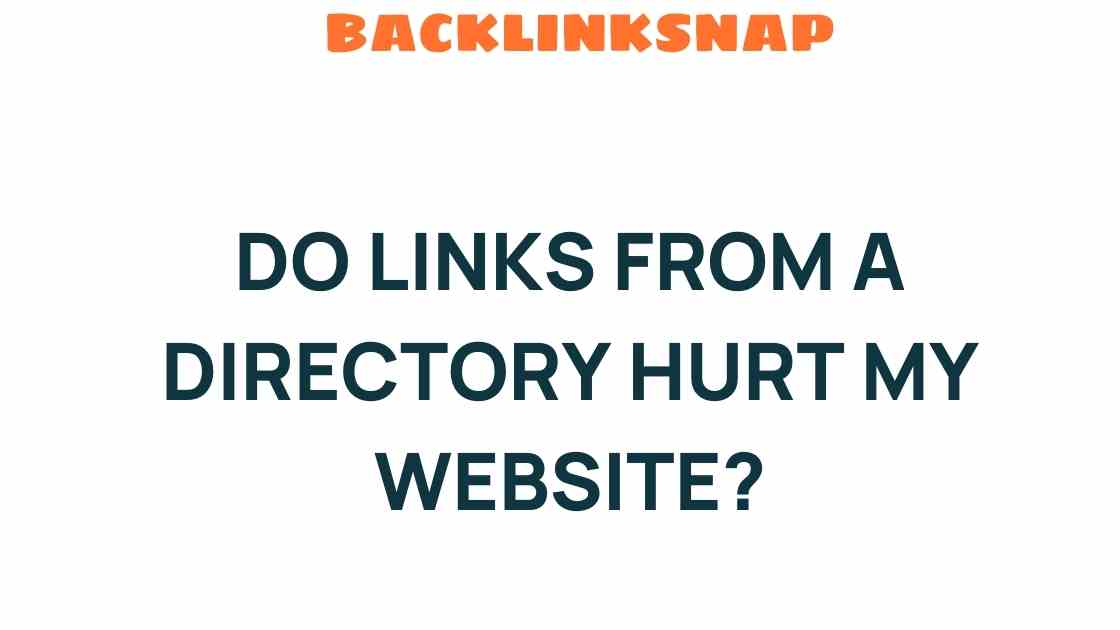Do Links from a Directory Harm Your Website’s Reputation?
In the ever-evolving landscape of digital marketing, the importance of directory links as a tool for enhancing online visibility and improving website reputation cannot be overstated. However, the question remains: do these links truly bolster your site’s credibility, or can they potentially harm it? To navigate this complex topic, we’ll delve into the SEO impact of directory links, assess their quality, and explore best practices for leveraging them effectively.
Understanding Directory Links
Directory links are hyperlinks that lead to your website from a web directory—a structured listing of websites, often categorized by industry or niche. These directories can serve as valuable resources for users seeking specific information. However, not all directories are created equal, and the quality of these links can significantly impact your site’s SEO performance.
The SEO Impact of Directory Links
When it comes to search rankings, directory links can play a dual role. On one hand, quality backlinks from reputable directories can enhance your site’s authority, leading to improved rankings on search engines. On the other hand, links from low-quality or spammy directories can harm your site’s reputation and reduce its visibility.
According to a study by Moz, the quality of backlinks is a critical factor in determining search engine rankings. High-quality backlinks can boost your domain authority, while low-quality ones can lead to penalties from search engines like Google. Thus, it’s crucial to be discerning about where you establish your backlinks.
Link Quality vs. Quantity
The old adage “quality over quantity” rings especially true in the realm of SEO. While it might be tempting to seek out numerous directory links, focusing on the quality of those links is far more beneficial. Here are some characteristics of high-quality directory links:
- Relevance: The directory should be relevant to your industry or niche.
- Authority: The directory should have a strong domain authority and a positive reputation.
- Traffic: A reputable directory should attract a significant amount of traffic, indicating that it is a trusted resource.
- Moderation: The directory should have a process for reviewing submissions, ensuring that only legitimate sites are listed.
In contrast, links from low-quality directories—often filled with spammy or irrelevant sites—can lead to a negative impact on your website reputation. This is particularly true if search engines perceive your site as being part of a link scheme or manipulative practices. Therefore, it’s essential to conduct thorough research before submitting your site to any directory.
Best Practices for Using Directory Links
To effectively leverage directory links without compromising your site’s reputation, adhere to these SEO best practices:
- Choose Wisely: Always select reputable directories that align with your business and target audience.
- Limit Your Submissions: Focus on a handful of high-quality directories rather than spreading yourself too thin.
- Stay Updated: Regularly review your directory listings and remove any that may have lost credibility or gone offline.
- Monitor Your Backlinks: Use tools like Google Search Console or Ahrefs to keep track of your backlinks and their quality.
By following these guidelines, you can enhance your online visibility while safeguarding your website’s reputation.
Common Misconceptions About Directory Links
There are several myths surrounding directory links that can mislead website owners:
- All directories are bad: While many low-quality directories exist, there are also numerous reputable ones that can provide valuable backlinks.
- More links equal better SEO: As mentioned earlier, it’s the quality of links that matters, not just the quantity.
- Directory links are obsolete: While the SEO landscape has changed, directory links still play a role in a well-rounded SEO strategy.
Conclusion
In conclusion, links from directories do not inherently harm your website’s reputation; rather, it depends on the quality of those links. By focusing on reputable, relevant directories and adhering to SEO best practices, you can harness the power of directory links to enhance your site’s authority and visibility. Remember, the digital marketing landscape is vast, and staying informed and strategic will always serve you well.
FAQs About Directory Links
- Do all directory links hurt SEO?
No, only low-quality or spammy directory links can harm your SEO. Quality links can improve your rankings. - How do I find reputable directories?
Research directories within your industry, check their domain authority, and read reviews to ensure their credibility. - Can directory links affect my website’s ranking?
Yes, quality backlinks from reputable directories can enhance your website’s authority and improve its search rankings. - What are some examples of reputable directories?
Examples include Yelp, Yellow Pages, and industry-specific directories relevant to your niche. - How many directory links should I aim for?
Focus on a few high-quality directory links rather than many low-quality ones. Quality is more important than quantity. - Is it worth the time to submit to directories?
Yes, if you choose reputable directories, it can enhance your online visibility and contribute positively to your SEO strategy.
For more insights on improving your site’s reputation and visibility, check out this comprehensive guide on SEO best practices. And for a broader understanding of how backlinks work, refer to authoritative sources like Moz’s Beginner’s Guide to SEO.
This article is in the category Backlink and created by BacklinkSnap Team




